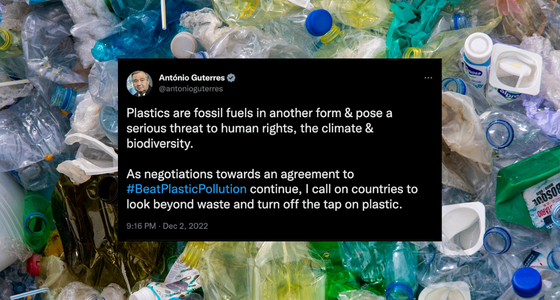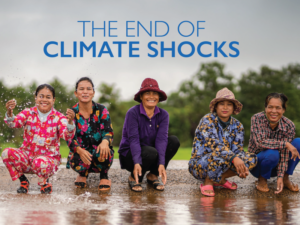
| 2022 was the year that the Treaty evolved from a conceptual solution to a proposal that people want on the table, as proven by its substantial backing from two countries, 74 cities, over 500 parliamentarians, and diverse representatives from multiple sectors. Without further ado, here are our top ten highlights of the year:At COP27, the Fossil Fuel Treaty became the talk of the town thanks to a historic endorsement from Tuvalu during their world leaders’ address. This built on the momentum from only 2 months before when Vanuatu became the first nation-state to endorse the Treaty at the UN General Assembly.Despite the disappointing inaction on fossil fuel phaseout at this year’s UN climate talks, the loss and damage fund was a win for vulnerable communities from the Global South, and only strengthened the case for a Fossil Fuel Treaty. After all, more fossil fuels equals more loss and damage.The European Parliament passed a resolution calling on nation-states to develop a Fossil Fuel Treaty as part of their demands ahead of COP27. In direct response to this, Brussels-Capital region, the headquarters of the European Union, endorsed the treaty and committed to move away from fossil fuels as part of their Climate Energy Plan.An additional 39 cities came out this year to back the Treaty, some of the most recent being Haiti’s capital Port-au-Prince, and Turin, a first for Italy. Other important endorsements include London, the largest city to endorse, and Belem, the first to lend its support in the Amazon. At the World Mayors Summit in Argentina, C40 Cities Chair Sadiq Khan urged fellow government leaders to endorse the Fossil Fuel Treaty!The treaty saw a diversification of voices in the grassroots movement, with an outpour of support from faith leaders of different religions, health institutions including the World Health Organization, and youth. We also gained over half a million signatures on Tuvalu’s public petition for a Fossil Fuel Treaty!At Stockholm+50, the UN finally recognized the need to phase out fossil fuels.We welcomed the launch of the Global Registry of Fossil Fuels developed by Carbon Tracker and Global Energy Monitor, the first-ever fully public database on the production of coal, oil and gas — marking a crucial step in holding governments accountable on their fossil fuel production.In collaboration with the University of Sussex, we created the Fossil Fuel Non-Proliferation Policy Tracker, an open-sourced interactive tool to track supply-side policies on fossil fuels around the globe.We released and supported the development of multiple reports this year such as ‘Fuelling Failure‘ on the relation of SDGs to fossil fuels, and the ‘Fossil Fuelled Fallacy‘ about the ‘dash for gas’ in Africa.We grew our audience significantly through our engagement with the media, earning over 3,700 mentions of Treaty on articles spanning multiple languages. The Guardian, The New York Times, Le Monde, CBC, and Financial Times were just some of the notable outlets to feature us. |
| DEMANDS TO END ‘DASH FOR GAS’ IN AFRICA IGNORED AT COP27 Campaigners wasted no time at what was dubbed ‘the African COP’ in calling for an end to gas expansion in Africa. Don’t Gas Africa launched a study debunking key arguments used by the fossil fuel industry to justify the ‘dash for gas’ in Africa by concluding it was “nothing more than a shortsighted strategy to profit from the energy crisis.” However, these demands largely fell on deaf ears. Just this month, Global Energy Monitor published a report exposing a whopping US$245 billion worth of planned investments across Africa for liquified natural gas terminals, gas pipelines and power stations. These represent an enormous stranded asset risk, as they are not intended for domestic consumption, but as a short-term ‘solution’ for Europe’s energy crisis resulting from the Russian invasion of Ukraine. |
 |
| PLASTICS TREATY NEGOTIATIONS SPUR LARGER CONVERSATION ON FOSSIL FUELSIn Uruguay, governments met to begin negotiations for a global Plastics Treaty. The Fossil Fuel Non-Proliferation Treaty Initiative is paying close attention to the process, given its potential of setting a precedent for a treaty like ours. Already, in the first round, plastics producers and their allies attempted to replicate the weaknesses of the Paris Agreement by blocking countries’ ability to vote on real progress. However, significant steps were taken in magnifying the connection between fossil fuels and plastic, with UN Secretary General Antonio Guterres pointing out: “Plastics are fossil fuels in another form & pose a serious threat to human rights, the climate and biodiversity.” Just as reliance on fossil fuels, especially oil & gas are in decline, prospects for growth in plastics are limited. It’s only a matter of time before their business model unravels and is exposed for its unsustainability for the planet, and incompatibility with human rights. |
 |
| NEW REPORT ON OIL & GAS EXPANSION IN THE AMAZON REINFORCES NEED FOR A FOSSIL FUEL TREATYThe Earth Insight’s Crisis Point report was recently released at COP 15 – exposing the threats of oil and gas expansion to forests and communities in the Congo and the Amazon. It found that in Africa, exploration blocks for oil & gas quadruple the current area in production. These overlap 30% of undisturbed forests in Africa. 90% of these are located in the Congo Basin — home to over 150 distinct ethnic groups, and more than 32 million people. The document points to “widespread commitments to the Fossil Fuel Non-Proliferation Treaty” as one of the solutions and reference points for action. |
 |
| IN THE MEDIAVanuatu made headlines this month for their release of the draft resolution on the International Court of Justice Advisory Opinion, prompting conversations with President Nikenike Vurobaravu in the Financial Times and the New York Times about Vanuatu’s historic endorsement of the Fossil Fuel Treaty. Filipino climate activist Mitzi Jonelle Tan named the Treaty as one of the climate fights to watch in 2023 on Context. Desmog published an opinion piece calling Treaty a bold mechanism “needed to end fossil fuel-induced violence against women.” Alex Rafalowicz criticised the UN Climate Summit’s ability to take real climate action in an interview with El Pais. The Treaty was popular on podcasts in the aftermath of COP27. Tzeporah Berman talked about the climate summit’s outcome and linked it to our movement in interviews with Real Media and The Good Future Project. She also appeared on TedxLondon’s Climate Curious podcast and Who Cares Wins with Lily Cole. Deputy Director Rebecca Byrnes guested on the Funny You Should Ask podcast to discuss Australia’s role in the climate crisis. |
 |
| CARVING A PATHWAY FOR 2023The campaign for a Fossil Fuel Non Proliferation Treaty has made great progress in 2022. We must keep momentum going. Coming into 2023, we aim to advance towards a Treaty on all fronts:With two countries on board, we are seeking to expand that list on both the national and subnational level, as well as explore more representation from every continent. We will continue to be a leading voice at the international level in the movement against fossil fuels by making our presence known in global convenings in the coming year, and building our engagement in international media.The Treaty initiative has always been a collaborative effort, and we are counting on the coalitions and networks we are a part of and will continue to contribute to over the years, to catalyse impact in every corner of the world.Happy Holidays! Here’s to a fossil-free 2023! |




